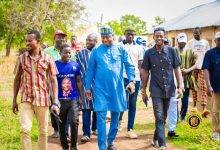This year’s scheduled three-day New Year School and Conference that started on January 25 and expected to end yesterday was abruptly closed on the night of January 26.
However, an important feature of the annual event, the issuance of a communique at the end of it, was not sacrificed.
As usual the Communiquetouches on pressing national issues that call for urgent attention.
As expected, this year’s one captured issues of the COVID-19 pandemic; mobilisation of domestic revenue; and emerging technologies and the need to leverage them.
One major issue is the need for the Ministry of Health, Ministry of Science and Technology and the Ghana Health Service to collaborate with stakeholders in the health sector to provide continuous professional development in digital literacy and skills to healthcare workers to enable them to use emerging technologies effectively.
Greening Ghana for food and jobs during pandemic era and beyond and to push for industrialization; considering the private sector and the youth as engine of growth of the economy; and adopting policy initiatives at the state and institutional levels to address educational challenges in deprived communities were also adopted.
There are other issues which the limited space for this piece cannot capture and so there is the need for readers to get and read the full document.
This is because all the issues are very important and once majority of the people get the knowledge of them, those who care to use the information in any useful way would be duely guided.
For instance, the information can be used to inform public discourse and also ascertain what the government and its relevant agencies are doing about them.
Some of the details are worth studying such as in the case where the communique states that land and border closure following the COVID-19 outbreak in the country is rather worsening security management due to the use of many unauthorized entry points used by illegal immigrants into the country.
It adds that the situation has increased cost ofdoing business for those at lower levels of the Ghanaian economic ladder, who normally want to use the border lawfully.
In the circumstances, the Government has been called upon to replicate COVID-19 measures at the airports at the land borders to facilitate livelihoods of the marginalized.
The communique also asks the Government to do more in the mental health sector by organizing psychosocial programmes on individual resilience against the pandemic as part of peace promotion for the vulnerable groups in the society.
All the actions suggested need money to prosecute, which is why the points raised about revenue mobilization and expenditure are noteworthy.
The government has been urged to introduce innovative ways of domestic revenue mobilization based on data while cutting down on unnecessary expenditure and wastage in the public sector.
One issue the communique raises on revenue mobilization is its call on the government to reverse its directive which mandates the Ghana Revenue Authority (GRA)to collect the country’s property rates as captured in the e 2022 Budget Statement and Economic Policy.
The Ghanaian Times supports the idea of the assemblies collecting the rates and saving them for use as part of their internally=generated funds.
If there are challenges the central government would like to come in to address, that is acceptable.
There is the possibility that there would be challenges accessing such funds from the GRA due to bureaucracy.
Also, it cannot be discounted that the central government can borrow or divert the accrued rates.
While discussing all the issues, we must not lose sight of the fact that the theme for the year’s New Year School and Conference was ‘COVID-19 and Socio-economic dynamics in Ghana’ as we need to be constantly reminded that we need to fight the disease while we leverage the innovations it has forced on society such as digitalization.



